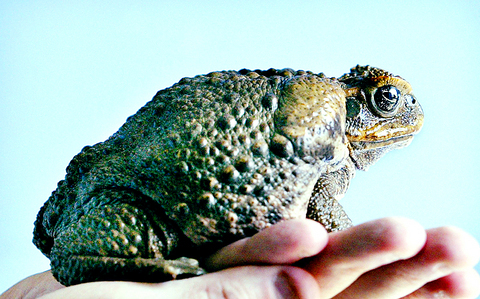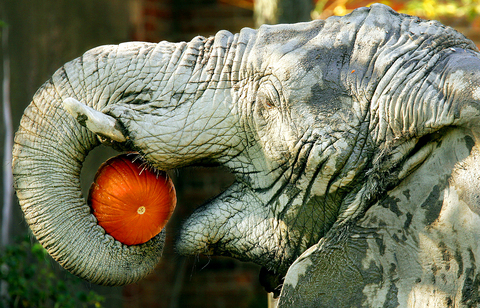A longside tragedies, wars and natural disasters, this year has brought its share of unusual, outrageous, tragi-comic and just downright silly news items.
Among the oddities served up by the world of science:
● A Swiss woman sees colors and experiences tastes when she hears music, scientists at the University of Zurich in Switzerland reported. The rare phenomenon, known as synaesthesia, was confirmed in a 27-year-old professional musician, who saw violet on hearing an F sharp and red on a middle C.

PHOTO:AFP
● Researchers at National University in La Jolla, California, threw a dinner party and then analysed the leftovers to see if their guests left significant DNA samples on them. Complete profiles were recovered from 43 percent of the sample, and partial ones from 33 percent. Such work could be useful in catching burglars, who often like tucking into the food found in their victims' kitchens.
● African elephants have at least one thing in common with parrots: they imitate sounds they hear around them, said scientists in the US and Norway. A captive female jumbo in Kenya was found to imitate the noise of trucks on a nearby road, while a male kept with Asian elephants at a zoo in Switzerland mimicked their chirping noises.
● Enterprising students at Brown University in the United States invented an alarm clock that monitors its user's brainwaves and works out the best time to wake him or her up. The only drawback: the sleeper must wear a headband equipped with electrodes.

PHOTO: AFP
● Alexis Lemaire, a 24-year-old student in Reims, France, claimed a world record for working out the 13th root of a 200-digit number by mental arithmetic. The feat, checked by a notary, took him 48 minutes and 51 seconds.
● Also in the maths department, Akira Haraguchi, a 59-year-old psychiatric counselor in Japan, recited from memory the value of "pi," a constant which consists of an infinite string of digits, to 83,431 decimal places. It took him 13 hours to beat the previous record, also set by a Japanese, of a mere 54,000 digits.
● The guardians of animal nomenclature had mixed feelings over a proposal to name three newly-discovered species of slime-mould beetle after US President George W. Bush, US Vice President Dick Cheney and US Defense Secretary Donald Rumsfeld. A pair of insect experts reserved the names Agathidium bushi, Agathidium cheneyi and Agathidium rumsfeldi for their latest creepy-crawlies.

PHOTO: EPA
● An odd-looking rodent spotted on sale for meat in a Laotian food market turned out to be not only a new species but also the first member of a new family of mammals to be identified in more than three decades. An alert member of the New York-based Wildlife Conservation Society noticed the creature, which was baptized a stone-dwelling puzzle-mouse -- or, more simply, "rock rat".
● Cane toads, reptiles imported into Australia in the erroneous belief that they would eliminate pests from sugar-cane fields, are attracted by disco-style flashing lights, said researchers in the Northern Territory who are desperate to find a way of eliminating the fast-spreading creatures. "The old toads are definitely a disco animal," said a member of a group called Frogwatch.
● The fashion for television detective series which focus on forensic science may be unwittingly providing tips to real-world criminals, a study by British researchers said. Some forensic scientists were even becoming unwilling to cooperate with the media for precisely that reason.

PHOTO: AP
● Proof that scientists have a sense of humor: the annual Ig Nobel awards, which give spoof prizes to the most offbeat research. This year's crop went to the inventor of an alarm that rings then runs away and hides, thus ensuring that the sleeper has to get up to turn it off... to scientists who researched whether humans swim faster in syrup rather than in water... to British boffins who analysed the electrical activity of a locust's brain cell while the insect watched a Star Wars movie... and to a German team that calculated the pressure produced in penguins' anuses when the birds expel their faeces.

Behind a car repair business on a nondescript Thai street are the cherished pets of a rising TikTok animal influencer: two lions and a 200-kilogram lion-tiger hybrid called “Big George.” Lion ownership is legal in Thailand, and Tharnuwarht Plengkemratch is an enthusiastic advocate, posting updates on his feline companions to nearly three million followers. “They’re playful and affectionate, just like dogs or cats,” he said from inside their cage complex at his home in the northern city of Chiang Mai. Thailand’s captive lion population has exploded in recent years, with nearly 500 registered in zoos, breeding farms, petting cafes and homes. Experts warn the

The unexpected collapse of the recall campaigns is being viewed through many lenses, most of them skewed and self-absorbed. The international media unsurprisingly focuses on what they perceive as the message that Taiwanese voters were sending in the failure of the mass recall, especially to China, the US and to friendly Western nations. This made some sense prior to early last month. One of the main arguments used by recall campaigners for recalling Chinese Nationalist Party (KMT) lawmakers was that they were too pro-China, and by extension not to be trusted with defending the nation. Also by extension, that argument could be

Aug. 4 to Aug. 10 When Coca-Cola finally pushed its way into Taiwan’s market in 1968, it allegedly vowed to wipe out its major domestic rival Hey Song within five years. But Hey Song, which began as a manual operation in a family cow shed in 1925, had proven its resilience, surviving numerous setbacks — including the loss of autonomy and nearly all its assets due to the Japanese colonial government’s wartime economic policy. By the 1960s, Hey Song had risen to the top of Taiwan’s beverage industry. This success was driven not only by president Chang Wen-chi’s

Last week, on the heels of the recall election that turned out so badly for Taiwan, came the news that US President Donald Trump had blocked the transit of President William Lai (賴清德) through the US on his way to Latin America. A few days later the international media reported that in June a scheduled visit by Minister of National Defense Wellington Koo (顧立雄) for high level meetings was canceled by the US after China’s President Xi Jinping (習近平) asked Trump to curb US engagement with Taiwan during a June phone call. The cancellation of Lai’s transit was a gaudy